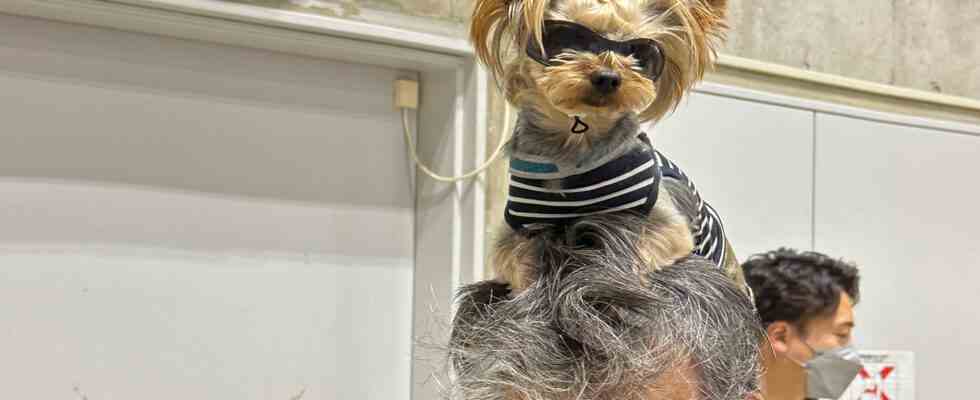Status: 01/10/2023 08:39 a.m
The low birth rate is becoming a major problem in Japan. Many choose to have a fluffy pet rather than a child. Why are the hurdles often high to become parents yourself? A visit to a pet fair provides the answers.
Mini dresses, water dispensers, healthy snacks, every kind of leash – and rabbits that are placed on your lap to be petted. Genki and Kanako were particularly excited about the latter. For several minutes they both scratched through the rabbits’ fluffy fur while their eyes wandered into the distance.
The animals are cute and it was a nice experience, both agree. The couple, 40 and 35 years old, have a cat at home but no children: “It wasn’t a conscious decision. Just because we have a pet doesn’t mean we don’t want children.” In any case, Kanako believes that love for a pet is the same as love for a child.
100 euros per month for the dog
In the case of Mina, that actually seems to be the case. Your little Tibetan lion dog is already well equipped: “He has a collar, a hat, an anorak with a sewn-in dog leash over his undershirt and a reflector.”
He lies comfortably on several pillows in his dog buggy, warmed by a fluffy blanket. If the little dog is thirsty, Mina presses the plastic bottle on the wagon. The water then flows directly into an integrated bowl. “I spend about 10,000 yen a month on my dog,” says Mina. That’s around 70 euros – Mina is below the Japanese average, which is 100 euros a month for dogs.
Single parents have a hard time in Japan
The 36-year-old has had her dog for 14 years. Having a child was and isn’t an issue for her because she doesn’t have a partner. “I’m not married, so I don’t have any children,” she says. “But of course a child is also more complex than a pet.”
And possibly being a single parent is not an option for them. Not only financially, but also socially, single parents have a hard time in conservative Japan. However, many women also have no desire to give up their job after giving birth, as is still often expected of them.
Call for more support for families
Hiroyuki and Ayako have a pet pig – and a child. They believe there should be more financial support for families: “Artificial insemination should be further expanded in Japan, and it should be completely free.”
Japan has made improvements in this respect, but there are still hurdles. Apart from the fact that the treatment often simply fails because of the age of the women.
A pet – a pig on the left, a dog on the right – seems to be the alternative to having a child for many Japanese.
Image: Kathrin Erdmann, ARD Tokyo
First a dog, then maybe a child
Hana and Tatsuya are prime ages for kids at 30 and 27 respectively. But the two first decided on a funny dog duo, which they drive in the car through the exhibition hall: “You’re probably more likely to get a dog than a child – and that’s very satisfying and also a bit like a child to raise.” Nevertheless, at some point they also wish for human offspring.
Takumu and Nozomi are not that far yet. Both, 28 and 25 years old, are a couple but they still live separately. Nozomi also already has a dog, and she also says: It’s much easier to raise than a child: “I was looking for an apartment that I could move into with a dog. And it’s the same with my friends, there there are also many who live alone with a dog.”
Japan’s government wants to increase the birth rate
In order to be able to bring children into the world, wages must first be increased, they both think. So says the Prime Minister of Japan, Fumio Kishida. In fact, wages have fallen rather than risen in the past.
The government wants to present a new plan to increase the birth rate by June – and hopes that more Japanese will then decide to have a child rather than a pet.
Dog instead of child – Japan’s love for pets
Kathrin Erdmann, ARD Tokyo, 10.1.2023 6:40 a.m

